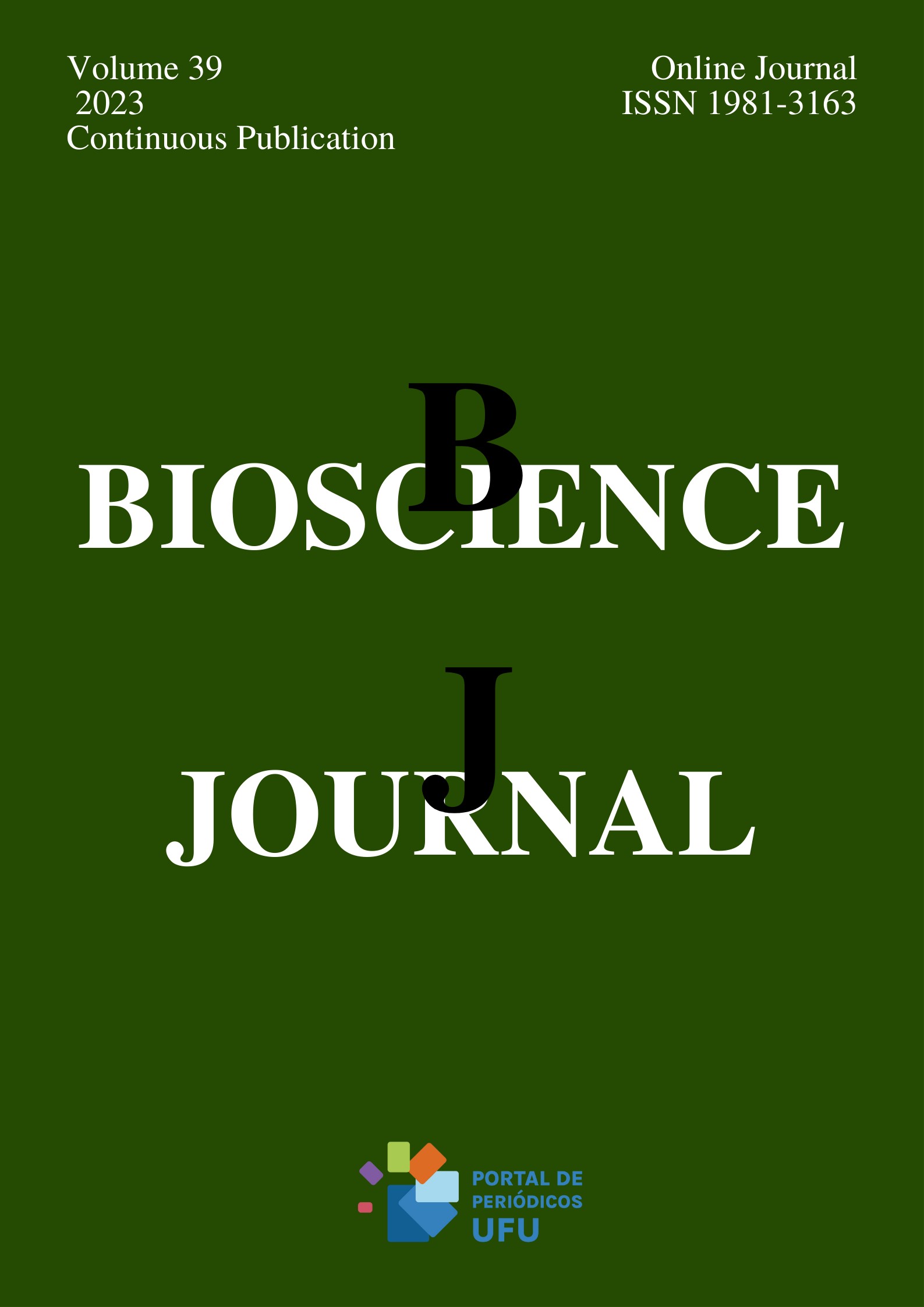Poultry litter and cover crops influence the agronomic performance and grain yield of wheat
DOI:
https://doi.org/10.14393/BJ-v39n0a2023-68812Keywords:
Grain yield, Mineral nutrition, Organic fertilization, Triticum aestivum L.Abstract
The use of poultry litter as a source of nitrogen (N) and the decomposition of ground cover plants can be an alternative and N management strategy in the wheat crop, in succession. Therefore, the objective of this study was to evaluate the effect of isolated and/or intercropped cultivation of ground cover plants in autumn/winter and the use of poultry litter on some plant parameters and on the final yield of wheat grains. The experimental design was randomized blocks, in split plots, with three replications. The treatments in the plots were composed of isolated coverings Avena strigosa Schreb., Raphanus sativus L. and intercropping of A. strigosa + R. sativus and fallow as a control. In the subplots, the N managements in the wheat crop with 100% of the N recommendation via poultry litter, 100% of the N via mineral (urea), 50% via poultry litter + 50% mineral and the control, without N application. The management of nitrogen fertilization and the cover crops altered the yield components of the wheat crop. The use of poultry litter increased the final grain yield, being an alternative as a partial replacement, when associated with urea, or total N. Isolated crops R. sativus and A. strigosa + R. sativus intercropping significantly influenced agronomic performance and final grain yield.
References
ABPA – Associação Brasileira de Proteína Animal. Relatório anual 2022. São Paulo, 2022. Available from: https://abpa-br.org/quem-somos/abpa-relatorio-anual/
AITA, C. and GIACOMINI, S.J. Decomposição e liberação de nitrogênio de resíduos culturais de plantas de cobertura de solo solteiras e consorciadas. Revista Brasileira de Ciência do Solo. 2003, 27, 601-612. https://doi.org/10.1590/S0100-06832003000400004
ALVARES, C.A., et al. Köppen’s climate classification map for Brazil. Meteorologische Zeitschrift. 2013, 22(6), 711-728. https://doi.org/10.1127/0941-2948/2013/0507
BASHIR, A., et al. An assessment of poultry farms for poultry litter production, disposal and its use as a fertilizer. Waste Forum. 2022, 3, 197-204.
BASSO, C.J., et al. Organic and mineral source of nitrogen associated with Azospirillum brasilense in culture of wheat. Journal of Agricultural Science. 2021, 13(12), 43-50. https://doi.org/10.5539/jas.v13n12p43
BRASIL. Ministério da Agricultura, Pecuária e Abastecimento. Regras para análise de sementes. Brasília, DF: MAPA/ACS, 2009.
BRIEDIS, C., et al. Efeito primário e residual de resíduos orgânicos de abatedouro de aves e suínos na produtividade do trigo. Revista Verde. 2011, 6(2), 221-226. https://www.gvaa.com.br/revista/index.php/RVADS/article/view/530
CAKMAK, I. Enrichment of fertilizers with zinc: An excellent investment for humanity and crop production in India. Journal of Trace Elements Medical and Biological. 2009, 23(4), 281-289. https://doi.org/10.1016/j.jtemb.2009.05.002
CHAUDHRY, A. N., et al. Influence of composting and poultry litter storage methods on mineralization and nutrient dynamics. J. Anim. Plant Sci. 2013, 23(2), 500-506.
CQFS-RS/SC. Comissão de Química e Fertilidade do Solo. Sociedade Brasileira de Ciência do Solo (SBSC). Manual de adubação e calagem para os estados do Rio Grande do Sul e Santa Catarina. 11. Ed. Porto Alegre: Sociedade Brasileira de Ciência do Solo; Comissão de Química e Fertilidade do Solo – RS/SC, 2016.
DEMARI, G. H. et al. Cama de aves como alternativa para adubação nitrogenada em trigo. Revista Cultivando o Saber. 2016, 9(2), 224-242.
Galloway, J. N., et al. Transformation of the nitrogen cycle: Recent trends, questions, and potential solutions. Science, 320(587), 889-892. http://doi.org/10.1126/science.1136674
IBGE. Instituto Brasileiro de Geografia e Estatística. Indicadores IBGE – Estatística da Produção Pecuária, 2022. 52p. Available from: https://www.ibge.gov.br/estatisticas/economicas/agricultura-e-pecuaria.html
KSHEEM, A. M. et al. Toward a method for optimized extraction of soluble nutrients from fresh and soluble chicken manures. Waste Management. 2015, 45(76). http://doi.org/10.1016/j.wasman.2015.02.011
NASCIMENTO, C.D.V., et al. Acúmulo de nitrogênio e micronutrientes em leguminosas submetidas à adubação com resíduo orgânico. Enciclopédia Biosfera. 2014, 10(18), 109-118. https://conhecer.org.br/ojs/index.php/biosfera/article/view/2647
NETO, F.S. and CAMPOS, A.C. Plantas de cobertura antecedendo a cultura de trigo. Scientia Agraria Paranaensis. 2017, 16(4), 463-467. http://dx.doi.org/10.18188/1983-1471/sap.v16n4p463-467
NUNES, A.S., SOUZA, L.C.F. and MERCANTE, F.M. Adubos verdes e adubação mineral nitrogenada em cobertura na cultura do trigo em plantio direto. Bragantia. 2011, 70(2), 432-438. https://doi.org/10.1590/S0006-87052011000200026
RAWAL, N., et al. Nutrient use efficiency (NUE) of wheat (Triticum aestivum L.) as affected by NPK fertilization. PLoS ONE. 2022, 17(1), e0262771. https://doi.org/10.1371/journal.pone.0262771
R CORE TEAM R: A language and environment for statistical computing. R Foundation for Statistical Computing, Vienna, Austria. 2019.Available from: https://www.R-project.org/
RIBEIRO, R.H., et al. Seed and leaf inoculation with Azospirillum brasilense and increasing nitrogen in wheat production. Revista Brasileira de Ciências Agrárias. 2018, 13(3). https://doi.org/10.5039/agraria.v13i3a5550
ROGERI, D.A., et al. Composition of poultry litter in Southern Brazil. Revista Brasileira de Ciências do Solo. 2016, 40. https://doi.org/10.1590/18069657rbcs20140697
SANTOS, H. G. et al. Brazilian system of soil classification. Embrapa, Brasília, 2018, 356p.
SARKAWT, Z., et al. Effect of organic fertilizer and chemical fertilizer on growth and yield of Wheat (Triticum aestivum). Agricultural Science. 2023, 6(2). 155-173. https://doi.org/10.55173/agriscience.v6i2.99
TEDESCO, M.J., et al. Análise de solo, plantas e outros materiais. 2. Ed. Porto Alegre: Ed. UFRGS, 1995.
THOMAZINI, S.C.N., et al. Reutilização de cama de aviário compostada na produção e no crescimento inicial de mudas de eucalipto. Research, Society and Development. 2022, 11(10), e535111033141. http://dx.doi.org/10.33448/rsd-v11i10.33141
VESOHOSKI, F., et al. Componentes do rendimento de grãos em trigo e seus efeitos diretos e indiretos na produtividade. Revista Ceres. 2011, 58(3). https://doi.org/10.1590/S0034-737X2011000300014
VIOLA, R., et al. Adubação verde e nitrogenada na cultura do trigo em plantio direto. Bragantia. 2013, 72(1), 90-100. https://doi.org/10.1590/S0006-87052013005000013
WEILER, D.A., et al. Summer cover crops shoot decomposition and nitrogen release in a no-tilled sandy soil. Revista Brasileira de Ciências do Solo. 2019, 43. https://doi.org/10.1590/18069657rbcs20190027
WELCH, R. The impact of mineral nutrients in food crops on global human health. Plant Soil. 2002, 247(1), 83-90 https://www.jstor.org/stable/24123898
Downloads
Published
Issue
Section
License
Copyright (c) 2023 Eveline Ferreira Soares, Claudir José Basso , Mateus Júnior Rodrigues Sangiovo, Eduarda Vargas de Souza Leandro, Diógenes Cecchin Silveira, Thainá Fogliatto Moreira

This work is licensed under a Creative Commons Attribution 4.0 International License.





